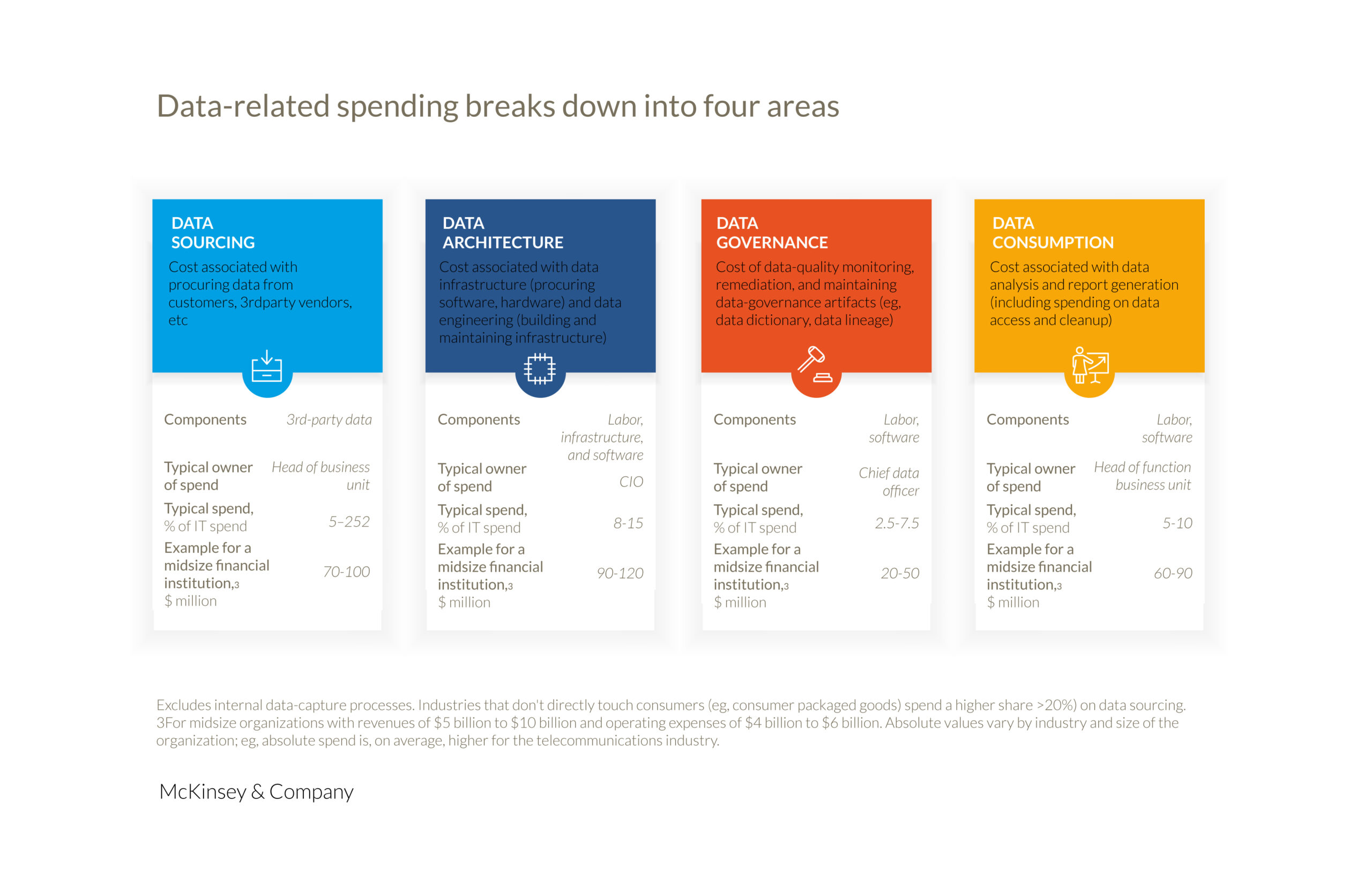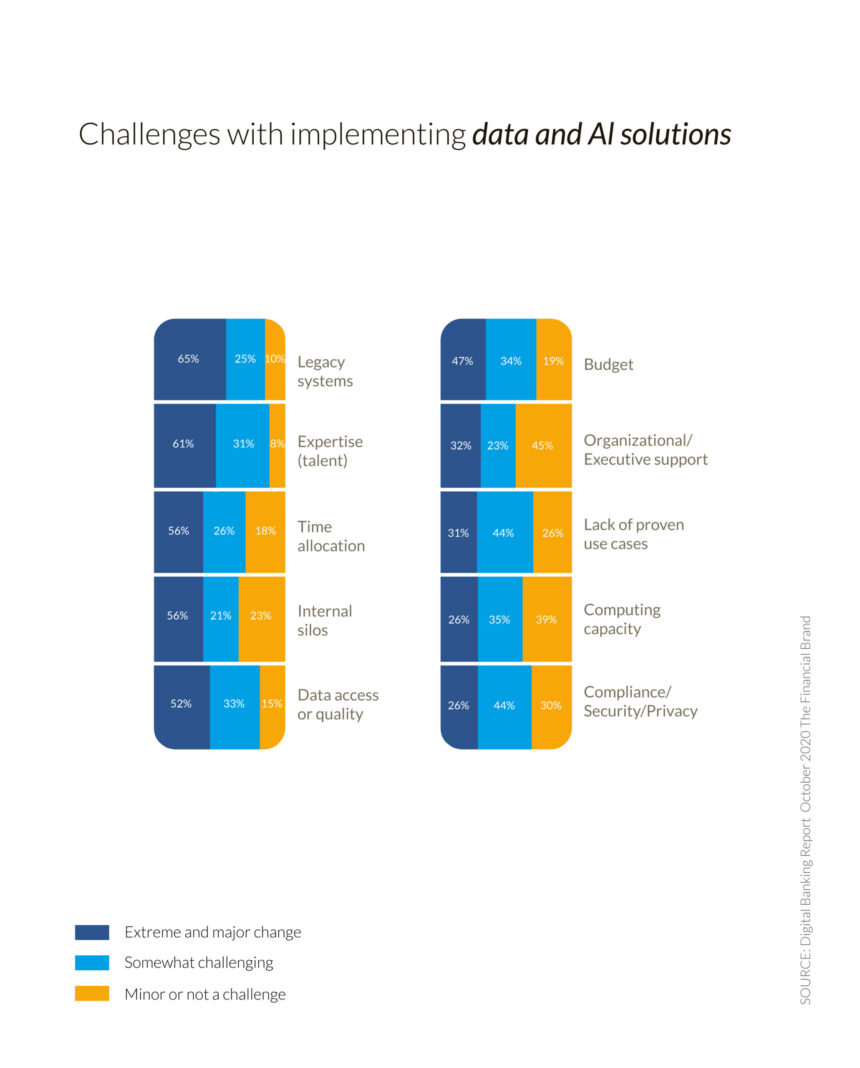Finding the right governance and strategy:
Reimagining banking in an AI world requires turning assumptions, systems and processes on its head. One of the primary reasons why banks are unable to transition from proof of concept to widespread AI implementation successfully is the lack of good strategy and governance. A well-defined strategy helps identify where and how AI should be adopted. It includes a clear change management strategy that will help the banking entity transition into the future. These are vital steps to ensuring a successful implementation. On the other hand, while strategy helps lay out the initial process, good governance is essential to the on-going AI practice. Identifying and safeguarding best practices ensures a successful AI initiative.
Overcoming hesitancy:
Despite AI being around for years, there is still a certain amount of distrust and fear among workers that AI is coming for their jobs. The banking industry is no different. The fact remains that while AI will certainly perform better than humans at some repetitive jobs, the combination of AI and human intervention is what makes it truly powerful. Consider this test conducted by doctors who created an AI-based system that could identify breast cancer cells. On its own, the AI program scored a high 92% accuracy score but was still lower than the success rate of human pathologists who score around 96%. However, when AI and human pathologists combined forces, the success rate was an astounding 99.5%2. Dr. Marcos López de Prado of Cornell’s School of Operations Research and Information Engineering was called before the Committee on Financial Services of the U.S. House of Representatives. His speech included the following statement, “Financial machine learning creates a number of challenges for the 6.14 million people employed in the finance and insurance industry, many of whom will lose their jobs—not necessarily because they are replaced by machines, but because they are not trained to work alongside algorithms. The retraining of these workers is an urgent and difficult task.”
A proper change management strategy will include dealing with the fear and hesitancy that teams may have. Teams that believe their jobs are at stake will not fully cooperate with the process of digitisation, placing every AI initiative in jeopardy. Retraining staff to work with machines rather than against it, is the only option that managers have today.
Why outsourcing will help
With the banking industry struggling to get their AI projects off the ground, many are turning to outsourcing to be the harbinger of hope. Outsourcing is not a new phenomenon to the banking industry. According to the World Retail Banking Report, almost 77% of all retail banks outsource at least one part of their business operations3. While traditionally, banks outsourced customer verification and other functions that were not business-critical, today, banks are looking to outsource to gain competitive advantage while also ensuring cost efficiencies.
What does outsourcing in tomorrow’s AI-first banking industry look like? It depends. Some banks are likely to outsource their entire AI function to a closely-aligned third party vendor. Others are likely to outsource some aspects of the initiative, while some may use the experts to help set up their strategy and governance models, while they ramp up and reskill their team. However they plan to use external help, it is apparent that most banks, around the world, need some level of assistance. Here are five reasons why it makes sense for banks to outsource some, if not most, of their AI initiative to qualified partners.
- Investments in the right technology infrastructure: As discussed in the previous section, the upfront technology investments required for a proper AI implementation are high. While most banks flinch in the face of investing a staggering amount when so much is at stake, external vendors already have the right infrastructure in place to successfully deliver an AI initiative. This is a natural extension of the existing practice where IT within the banking sector is an outsourced function. In addition, AI practitioners have a deep understanding of what technology stack to use, how to use it, when to scale, risks, limitations, and benefits and more. When problems arise, rather than trying to resolve it with limited inhouse resources, these practitioners leverage their standing in the industry to consult with the best minds to find a resolution. They also keep abreast of the ever-evolving landscape of AI tools and platforms and cherry pick those that deliver value based on prior experience or their intense knowledge of how platforms work. Outsourcing AI ensures that the banking sector is better positioned to be successful in their endeavours just because they’ve called in the experts.
- Access to data: While banks have reams of financial data, customer data is scattered across the digital landscape of social media, emails, eCommerce, and more. The world of digital advertising has found ways to consolidate and monetise this data, and banks need to do the same. Most AI partners already have legal access to incorporate this information into their AI implementations. These deep wells of customer data pair well with the bank’s own information about their customers and will deliver insights that will help banks upsell and cross-sell with greater accuracy. This data also comes in handy when preventing fraud. With adequate data about a customer, each transaction performed by a customer is viewed holistically highlighting potential risks where appropriate. In addition, there are several aspects of data management that require specific expertise. While these skills are lacking among banking professionals, it is the backbone of an AI vendor’s business. From data mining, to classification, clustering, regression and pattern recognition, these processes are laborious and require dedicated resources. The banking sector, in addition to not having these skillsets readily available, also cannot afford to drastically increase their headcount to ensure they have the resources required to convert vast amounts of data into intelligence.
- Skillsets on demand: With AI being the hottest skill in any marketplace today, AI partners have access to a variety of skillsets at any given point of time. The ability to scale up or down a team is relatively simple when AI is outsourced to a credible vendor. The Digital Banking Report found that banks looked outside their walls for talent by contracting with both existing (50%) and new (43%) providers to get the skills needed. The research goes on to state that, “A robust ecosystem of partnerships helps banks and credit unions experiment, learn, and, ultimately, import capabilities that are necessary to adapt to acute and chronic disruption. Ecosystems enable organisations to operate more flexibly, providing access to more collaborators and a greater range of potential innovations, thereby increasing the volume, quality, and risk tolerance of experimentation and learning.”4
- Prior experience with an AI strategy: Rather than bet on a horse that is still learning to race, banks can place their bets on experienced practitioners who implement AI programs daily. While many managers may be comfortable using in-house resources, most banking professionals lack the experience or training required to successfully see an AI implementation through to the end. Whereas, AI vendors or partners come with a depth of knowledge that has been honed over many AI implementations and project. From best practices to adopt when it comes to governance to implementing change management within a bank, vendors come in with the required technical expertise—some of them even come with the required domain expertise. Staying up to date on current trends in AI, new tools and platforms available and more, are more of a probability with a partner whose sole purpose is to deploy AI initiatives successfully, than it is with an in-house team, no matter how dedicated they are.
- Faster time to market: The biggest reason why it makes sense for banks to outsource their AI function is because it is a ready-made solution with an almost plug and play approach. This ensures that banks are ready to go to market with AI-enabled offerings in a matter of days rather than months. Building an in-house team is a hard path that will yield results months after starting the initiative. With an external vendor, that time is reduced to a couple of months at best with a higher chance of achieving expected results.
In conclusion, AI is transforming how banks works. With many banks moving from experimenting with a proof-of-concept to a full-fledged AI practice, banks need to choose whether they will travel the hard road of building the expertise in-house or if they will leverage a third-party expert. Both approaches have benefits and risks with the third-party AI partner being a clear winner. Outsourcing AI to a credible partner ensures that banks can focus on their core competencies while reaping the benefits of a well-established AI practice.


